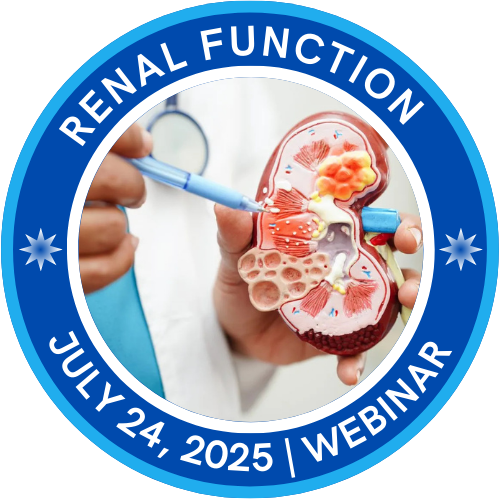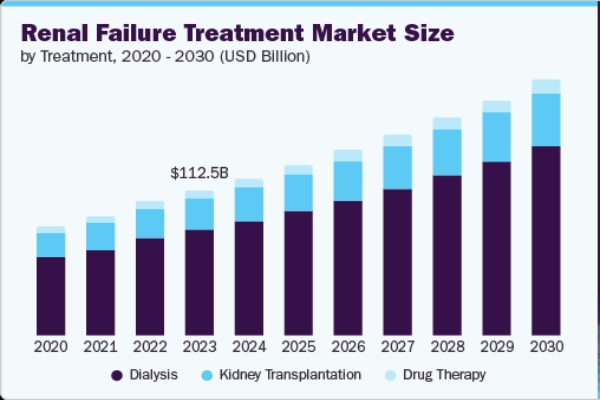"Understanding Your Kidneys: A Guide to Renal Health for a Healthy Life"
A warm welcome to the Renal Function Webinar, conducted on July 24, 2025, and proudly organized by ConfMeets. We are delighted to have you join us for this insightful session dedicated to exploring advancements, challenges, and innovations in renal health.
Today, we bring together esteemed experts, researchers, and healthcare professionals to share their knowledge and expertise. This webinar aims to foster meaningful discussions, enhance understanding, and contribute to improved patient care and clinical practices.
The Conference on Renal Function is a dedicated platform for medical professionals, researchers, and healthcare experts to discuss the latest advancements in nephrology and kidney disease management. The event aims to foster collaboration, share groundbreaking research, and explore innovative treatments that enhance patient care. With kidney diseases becoming increasingly prevalent worldwide, this conference provides an essential forum for addressing pressing challenges and solutions in renal health.
Renal function plays a crucial role in overall well-being, as the kidneys are responsible for filtering waste, regulating electrolytes, and maintaining fluid balance. This conference will delve into key topics such as chronic kidney disease (CKD), acute kidney injury (AKI), renal transplantation, and dialysis advancements. Experts will share insights on cutting-edge therapies, including regenerative medicine, artificial kidneys, and novel pharmacological approaches that are transforming the field of nephrology.

The renal system, primarily composed of the kidneys, plays a crucial role in maintaining homeostasis by filtering blood, removing waste, and regulating fluid and electrolyte balance. Each kidney is a bean-shaped organ located retroperitoneally on either side of the spine. Structurally, the kidney consists of the outer cortex and the inner medulla, which houses the renal pyramids that drain urine into the renal pelvis and subsequently into the ureter. Functionally, the nephron is the kidney's fundamental unit, responsible for filtration, reabsorption, and secretion. The renal corpuscle, composed of the glomerulus and Bowman’s capsule, filters blood, while the renal tubules modify the filtrate to regulate water, ions, and waste excretion. Additionally, the kidneys play a vital role in blood pressure regulation via the renin-angiotensin-aldosterone system (RAAS) and contribute to red blood cell production by secreting erythropoietin.
Renal function assessment is crucial for diagnosing and monitoring kidney health, as well as detecting early signs of kidney disease. Common diagnostic approaches include measuring serum creatinine and estimating the glomerular filtration rate (eGFR), which provides an estimate of how efficiently the kidneys filter waste from the blood. Blood urea nitrogen (BUN) levels are also assessed to evaluate nitrogen waste clearance. Additionally, urinalysis helps detect abnormalities such as proteinuria, hematuria, and the presence of casts, which can indicate underlying kidney conditions. Advanced diagnostic tools, such as renal imaging (ultrasound, CT, or MRI), and kidney biopsy, are utilized in cases requiring detailed structural and histopathological examination. Biomarkers like cystatin C and novel urinary markers are gaining significance in enhancing the early detection and risk stratification of kidney disease.
Chronic Kidney Disease (CKD) is a progressive condition characterized by the gradual loss of kidney function over time. The kidneys play a vital role in filtering waste, excess fluids, and toxins from the blood, maintaining electrolyte balance, and regulating blood pressure. CKD can be caused by various factors, including diabetes, hypertension, glomerulonephritis, and genetic disorders. In its early stages, CKD may not present noticeable symptoms, but as it advances, patients may experience fatigue, swelling, decreased urine output, and complications such as anemia, bone disease, and cardiovascular issues. Early detection through blood and urine tests is crucial for managing CKD and slowing its progression with lifestyle modifications, medications, and, in severe cases, dialysis or kidney transplantation.
Acute Kidney Injury (AKI) is a sudden and often reversible decline in kidney function, leading to the accumulation of waste products, electrolytes, and fluids in the body. It is typically caused by reduced blood flow to the kidneys, direct kidney damage, or obstruction of urine flow. Common risk factors include dehydration, severe infections, certain medications, and chronic conditions like diabetes and hypertension. Symptoms may include decreased urine output, swelling, confusion, and fatigue. Early diagnosis through blood tests (e.g., creatinine and blood urea nitrogen levels) and urine analysis is crucial for effective treatment, which may involve fluid management, medication adjustments, or dialysis in severe cases. Prompt intervention can improve outcomes and prevent progression to chronic kidney disease (CKD).
Hypertension (high blood pressure) and kidney disease are closely linked, as uncontrolled high blood pressure is one of the leading causes of chronic kidney disease (CKD). The kidneys play a vital role in regulating blood pressure by filtering excess fluid and waste from the blood. However, when blood pressure remains elevated for a prolonged period, it can damage the small blood vessels in the kidneys, reducing their ability to function properly. This can lead to a vicious cycle where kidney dysfunction further exacerbates hypertension, increasing the risk of kidney failure. Managing blood pressure through lifestyle modifications, medications, and regular medical checkups is crucial in preventing or slowing the progression of kidney disease.
Diabetic nephropathy and metabolic kidney disease are significant complications arising from metabolic disorders, particularly diabetes mellitus. Diabetic nephropathy is a progressive kidney disease caused by chronic high blood sugar levels, leading to glomerular damage, proteinuria, and ultimately kidney failure if left untreated. It is one of the leading causes of end-stage renal disease (ESRD) worldwide. On the other hand, metabolic kidney disease encompasses a broader spectrum of kidney dysfunctions associated with metabolic syndrome, obesity, hypertension, and dyslipidemia. These conditions contribute to renal injury through mechanisms like oxidative stress, inflammation, and endothelial dysfunction. Early detection and management of risk factors, such as blood glucose and blood pressure control, along with lifestyle modifications, play a crucial role in slowing the progression of these diseases and preserving kidney function.
Genetic and autoimmune kidney diseases are conditions that affect the kidneys due to inherited mutations or immune system dysfunction. Genetic kidney diseases, such as polycystic kidney disease (PKD) and Alport syndrome, result from mutations in specific genes that impact kidney structure and function, often leading to chronic kidney failure over time. Autoimmune kidney diseases, like lupus nephritis and IgA nephropathy, occur when the body's immune system mistakenly attacks kidney tissues, causing inflammation and damage. Both types of conditions can lead to progressive kidney dysfunction, requiring careful management through medication, lifestyle changes, and in severe cases, dialysis or kidney transplantation. Early diagnosis and treatment are crucial in preventing complications and preserving kidney function.
Kidney Replacement Therapy (KRT) is a treatment for individuals with severe kidney failure, also known as end-stage renal disease (ESRD). It includes three main options: dialysis (hemodialysis or peritoneal dialysis), kidney transplantation, and conservative management. Dialysis helps remove waste, excess fluids, and toxins from the blood when the kidneys can no longer perform these functions. A kidney transplant offers a more permanent solution by replacing the damaged kidney with a healthy donor organ, restoring near-normal kidney function. While transplantation is the preferred option for many, not all patients are eligible due to health conditions or organ availability. In cases where dialysis or transplantation is not pursued, conservative management focuses on symptom relief and quality of life. The choice of therapy depends on various factors, including the patient’s overall health, lifestyle, and medical recommendations.
Electrolyte and acid-base disorders are common complications of kidney disease due to the kidneys' vital role in maintaining homeostasis. Impaired kidney function can lead to imbalances in key electrolytes such as sodium, potassium, calcium, and phosphate, resulting in conditions like hyperkalemia, hyponatremia, and metabolic acidosis. Metabolic acidosis, a frequent consequence of chronic kidney disease (CKD), occurs when the kidneys fail to excrete sufficient hydrogen ions and regenerate bicarbonate, leading to a decrease in blood pH. This acid-base imbalance can contribute to bone demineralization, muscle wasting, and cardiovascular complications. Managing these disorders requires careful monitoring, dietary modifications, and, in some cases, pharmacologic interventions like bicarbonate supplementation or potassium binders to prevent life-threatening complications.
Pediatric nephrology is a specialized branch of medicine that focuses on diagnosing and treating kidney-related disorders in children, from infancy through adolescence. These conditions may include congenital kidney abnormalities, nephrotic syndrome, urinary tract infections, chronic kidney disease, and hypertension. Pediatric nephrologists play a crucial role in managing kidney function, ensuring proper growth and development, and preventing complications that could lead to long-term kidney damage. Treatment approaches often involve medication, dietary modifications, dialysis, or, in severe cases, kidney transplantation. Early diagnosis and specialized care are essential in improving outcomes and quality of life for children with kidney disorders.
Emerging trends and innovations in nephrology are revolutionizing the diagnosis, treatment, and management of kidney diseases. Advances in artificial intelligence (AI) and machine learning are enhancing early detection of chronic kidney disease (CKD) through predictive analytics, improving patient outcomes. Precision medicine, driven by genomics and biomarkers, is enabling personalized treatment plans tailored to an individual’s genetic profile. Additionally, bioengineered kidney tissues and regenerative therapies hold promise for reducing dependence on dialysis and transplants. Wearable dialysis devices and advancements in implantable artificial kidneys are also transforming renal replacement therapy, offering improved quality of life for patients. Furthermore, digital health solutions, such as remote patient monitoring and telemedicine, are enhancing accessibility and continuity of care, ensuring better disease management. These innovations collectively mark a new era in nephrology, with the potential to significantly improve kidney health worldwide.
Maintaining kidney health requires a proactive approach through lifestyle choices, balanced nutrition, and preventive measures. A kidney-friendly lifestyle includes regular physical activity, adequate hydration, and stress management to reduce the risk of chronic kidney disease (CKD). Nutrition plays a crucial role, with a diet rich in fruits, vegetables, lean proteins, and controlled sodium, potassium, and phosphorus intake to support renal function. Preventive nephrology emphasizes early screening for kidney disease, especially in high-risk individuals like diabetics and hypertensives, along with managing comorbidities to slow progression. By adopting these strategies, individuals can significantly reduce their risk of kidney-related complications and enhance overall well-being.
Our webinars are thoughtfully designed to deliver value to a wide range of individuals. Whether you're looking to grow your skills, explore new opportunities or gain insights from experts, here's who will benefit most from attending:
If you're aiming to advance in your career or stay updated with the latest trends in your field, this webinar is perfect for you. Gain actionable insights and learn from industry experts.
Professors, scholars, and students presenting findings or exploring the latest research in their field and individuals looking for collaboration opportunities.
Discover strategies, tools, and techniques to scale your business, enhance productivity, and achieve your goals. This is your chance to learn from real-world success stories.
Are you curious about new concepts or looking to bridge the gap between academia and industry? Our webinars provide practical knowledge that goes beyond textbooks.
Stay ahead of the curve! If you're passionate about the topic and want to understand the latest innovations, trends, or developments, you'll find immense value here.
In a world where knowledge is power, webinars have emerged as one of the most accessible and impactful ways to learn, grow and connect. Don't miss the chance to learn, grow and connect in ways that truly matter.
Webinars are often hosted by industry experts, thought leaders, and innovators. Attending gives you direct access to their insights, strategies, and expertise that you can immediately apply in your personal or professional life.
The digital world evolves rapidly. Webinars provide up-to-date information on the latest trends, tools, and techniques, ensuring you stay ahead of the curve in your industry or area of interest.
Webinars aren't just passive presentations they're dynamic and interactive. Participate in live Q&A sessions, answer polls, and share your thoughts with like-minded participants.
Webinars connect you with professionals, experts, and enthusiasts from around the globe. It's a unique opportunity to grow your network and collaborate with others who share your interests.
Many webinars are free or available at a fraction of the cost of in-person events. This makes them an affordable way to learn from experts without incurring travel or accommodation expenses.
Webinars often include access to resources such as presentation slides, e-books and recordings. These materials ensure you can revisit the content and reinforce your learning anytime.
A great webinar can spark new ideas and reinvigorate your passion for a topic. The insights you gain may open new opportunities or provide the push you need to achieve your goals.
Webinars are designed with specific audiences in mind. Whether you're seeking professional development, personal growth, or technical know-how, you're likely to find a webinar that suits your interests perfectly.
Stay ahead of the curve! If you're passionate about the topic and want to understand the latest innovations, trends, or developments, you'll find immense value here.
Best platform for Global business and Networking opportunities B2B Meetings Poster Sessions on every career stage Networking Opportunities
Registering for a webinar is essential to gain access to the unique opportunities and secure a chance to grow, connect and gain insights that can drive your personal and professional success. Webinars are more than just online meetings, they're gateways to knowledge, innovation, and growth.

The global renal failure treatment market was valued at USD 112.5 billion in 2023 and is projected to grow at a compound annual growth rate (CAGR) of 8.3% from 2024 to 2030. A variety of factors contribute to this market's expansion, including the rising prevalence of chronic kidney disease (CKD), advancements in technology and treatment techniques, increased awareness and education about kidney health, and supportive government initiatives and regulations. Together, these elements drive market development, resulting in better patient outcomes and improved access to care. For instance, in July 2023, Boehringer Ingelheim and Eli Lilly and Company declared that the European Medicines Agency (EMA) approved Empagliflozin as the first SGLT2 inhibitor for treating CKD in adult patients.
The growing population of older adults is a vital factor contributing to the growth of the chronic kidney disease treatment market. Older adults are particularly vulnerable to developing and progressing chronic kidney disease, which raises the demand for innovative treatment options. The Centers for Disease Control and Prevention (CDC) indicates that CKD mainly affects individuals aged 65 and older (38.0%), followed by those aged 45 to 64 years (12.0%) and those aged 18 to 44 years (6.0%). This demographic shift is anticipated to further boost market growth.
Advancements in treatment technologies also play a crucial role. Innovations such as high-efficiency dialysis machines, portable artificial kidneys, and improved dialyzer membranes are transforming renal healthcare. Recent innovations include the launch of portable dialysis systems that enhance patient mobility and comfort. For example, in February 2024, Fresenius Medical Care




